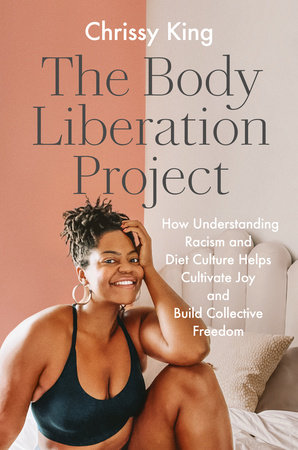Chapter 1
Understanding the Basic Concepts:
Body Positivity vs.
Body Neutrality vs.
Body Liberation
I have to be honest with you. Talking about diet culture and the intersection of white supremacy-it's really not a simple topic to address. I want to lead with this statement because, to put it mildly, sometimes people get upset when I voice my views. We are going to talk about a lot of things in this book-privilege, white fragility, and racism, among other things-while we talk about body liberation. In my opinion, we can't talk about liberation without discussing those topics. So if you're a member of the dominant group (i.e., if you're white), I want you to buckle up and get comfortable with the feeling of being uncomfortable.
My brilliant friend Shirin Eskandani once said, "Discomfort is where the growth is, it is where the medicine is, it is where the liberation is." And she's right, y'all. Probably a decade ago, maybe a little more, I stepped into a gym for the first time in my adult life with a singular goal, MAKE ME SKINNY, as I've already shared. Literally, that's what I told my first-ever trainer: I need to be skinny. I was going for the whole model look, you know? I envisioned the end product to be something like Naomi Campbell or Tyra Banks perhaps. You get the vibe. But anyway, before I hired my actual trainer, I did a free session with a male trainer. It was a promotional thing offered by the gym to encourage people to sign up with trainers. Because I went on to get certified and become a trainer myself, I can now confidently say that this man was an awful trainer. Not like he suggested bad exercises or didn't know anything about fitness. No, like he tried to kill me in my free session. I'm serious, y'all. Imagine a novice coming into the gym, bright-eyed and bushy-tailed with false hopes of someday looking like Iman. I was clearly delusional. This man took me through the most intense and challenging workout of my entire life-think lots of jumping, lunging, every high-intensity movement you can imagine. It was my first day in the gym-why would he do that to me? In all fairness, the details are hazy. I don't even remember it all because I almost blacked out. Seriously, I'm not kidding or exaggerating. I started shaking intensely and getting extremely dizzy. So much so that they brought me sugar packets to eat immediately. It was horrible, and yet I still signed up for a trainer-not him, but still, I signed up. The pain of that initial workout didn't deter me enough to quit. Apparently, I'm a glutton for punishment. I later went on to fall in love with strength training and powerlifting, so it was all worth it, despite the rocky start.
What I'm saying is that we have all done some hard things before. So like Shirin says, "If you can understand why the discomfort of a yoga pose is beneficial to your healing and growth, then you must understand that the discomfort of anti-racism work is one and the same." You can replace yoga with any difficult endeavor that you have done in your life. You dealt with the discomfort because you knew something beautiful was on the other side. The same applies as you read this book. If you find yourself feeling triggered or indignant at something I'm discussing, I'm going to politely request that you not be like Diane. Who is Diane, you ask? Diane is an angry person who sent me an email in response to an article I wrote. I really want to share the email with you verbatim because it's truly ludicrous, but apparently there are rules about these things and I guess I would need Diane's permission to share it. I feel very strongly that she would not in fact grant me permission, so I'll paraphrase it for you. It's truly a shame though, because the original email in its entirety is quite a gem.
Dear Miss King,
I have no choice but to email you about your hatred toward white women after receiving a text message about you. I'm going to be honest with you and your entire race, although I know you aren't ready for the truth. Your article is stupid and it's clear that you both hate white women and are jealous of them at the same time. You don't know anything about politics and no one cares what Black people think. Please get over your Black people victim sob story. Everyone is fed up with it, including the Blacks I know. It's clear you are jealous of white women and our beautiful glowing skin that you will never get to have. But you'll likely say I'm racist-LOLOLOLOL. In the future, you are going to be embarrassed of your conduct. Stop being stupid and find something of substance to write about.
Ciao, Diane
This is the watered-down version of the email, but alas, you get the gist of it. Ahh, Diane. Besides the fact that this email doesn't make sense in a lot of ways, it was also a complete waste of time. I don't reply to emails like this, y'all. So if you find yourself about to pull a Diane, dig out your journal and go "Dear Diary" style instead. Perhaps write out your feelings, and curiously and compassionately consider why you're feeling so triggered. But for the love of God, do not email me.
In the words of Layla Saad, "You cannot dismantle what you cannot see. You cannot challenge what you do not understand." As we work to dismantle diet culture and white supremacy in our lives, it can be an uncomfortable process. It's not warm and fuzzy work, and sometimes it has the potential to feel painful, disconcerting, and triggering. But we gotta face the facts, even when they're not pretty. It's all part of the process. When I first started powerlifting seriously, I developed a power phrase that I would repeat to myself before every heavy lift. "I can do hard things." That phrase served me in the gym and has since become a part of my practice anytime I'm doing something hard, in or out of the gym. I invite you to try it for yourself anytime you feel things getting hard. "I can do hard things." But honestly, if this book found its way to you, I trust that you're reading it because you are ready to embrace the body you have right now, and because you want liberation for yourself, and for all of us. Okay, so now that we got that out of the way, let's dive in.
While the words "body positivity," "body neutrality," and "body liberation" are often used interchangeably, in my opinion, they are quite different. It's wholly necessary that we understand the difference between these terms and truthfully interrogate the problems with some of these spaces.
If you do a simple Google search asking the question "What is body positivity?" you will get an array of answers, but most of them describe body positivity as a movement focused on empowering individuals to love and appreciate their bodies regardless of their size, shape, or weight. It preaches that all bodies are worthy of respect and love. If you look at the hashtag #BodyPositivity on Instagram, you will likely see a lot of women wearing swimsuits and discussing how much they love their bodies despite the fact that society has tried to tell them something was wrong with their bodies. You will probably also see a lot of messages about self-love mixed into the discussion.
While I think body positivity can be a good introduction to the concept of thinking about our bodies differently, I also believe that mainstream body positivity, now popular and trendy on social media outlets such as Instagram, can often prove to be a double-edged sword. Yes, in a lot of ways it can be helpful and has absolutely encouraged millions of people to feel better about their relationships with their bodies, but it's also been unintentionally harmful as well.
A lot of the messaging in the body positivity space encourages us to just love our bodies. If you have ever been on the receiving end of these messages, perhaps you found them frustrating. I know I did at times. If everyone else was capable of just donning a swimsuit and falling in love with their bodies, why wasn't I? The affirmations and mantras you were supposed to repeat to yourself didn't seem to be so effective when I tried them. I can't even tell you the amount of times I looked in the mirror repeating affirmations to myself only to walk away discouraged and frustrated with the image I saw reflected back.
If you're deep in the trenches grappling with body image issues, and you're being inundated with body positive influencers preaching self-love, all now appearing to effortlessly love their bodies, it can feel extremely frustrating. To be honest, telling people to just "love their bodies" isn't that helpful. If it were that easy, wouldn't we all already be doing that? And if you are already struggling with body image, watching other people pop the words "body positivity" on captions, encouraging you to just embrace yourself when that feels like the furthest thing from possible, often leaves you swimming in more guilt and shame. Here is another thing you have failed at. Everyone has found a way to accept their bodies, but you can't even do that.
While the movement largely focuses on self-love, it largely fails to acknowledge that it's much easier for some individuals to love themselves than for others. In a society in which certain bodies are deemed more beautiful, more worthy of dignity and respect, and, honestly, more valuable, I would argue that body positivity shouldn't just be about loving your body. It should be demanding justice for all bodies, especially the most marginalized. The intersection of race, gender, body politics, age, sexual orientation, and ability status are often left out of the conversation about body positivity. If social justice isn't at the core of the movement, there's nothing really radical about it, and it definitely isn't helping people find liberation.
While self-love and empowering individuals to appreciate their bodies are certainly part of it, the reality is that the body positivity movement has its roots in the fat acceptance movement of the 1960s, and it was created as a safe space for fat women and Black women to celebrate themselves and accept their bodies as beautiful in a world where they didn't see that reflected. It was really created for those on the margins of mainstream ideals of beauty-think Black and brown bodies, fat bodies, disabled bodies, trans bodies, etc. It was also rooted in social justice. However, mainstream body positivity has lost its focus in a lot of ways and has been co-opted and whitewashed, including even the history of the movement, with many individuals crediting plus-size model Tess Holliday, who is white, as the movement's creator because of a popular #EffYour BeautyStandards hashtag she started in 2013.
As Stephanie Yeboah, freelance writer and author of Fattily Ever After: A Black Fat Girl's Guide to Living Life Unapologetically, says, "[Body positivity] stems from the fat acceptance movement, which is more political than anything, [and] was created as a safe space for fat women to celebrate themselves as no one was celebrating us or seeing us-and all our interior amazingness-for what we were. Now it's used as a marketing term and has forgotten about the very bodies that created it."
The faces of body positivity have largely become thinner, straight-sized (a term used to describe the clothing sizes used by most designers, typically below a size 10), cisgender, non-disabled white women discussing embracing their rolls and cellulite. The issue is more than just the fact that they fail to acknowledge the origin of the movement-they also fail to realize how they take up too much space, pushing out the very individuals who created the movement. Now that body positivity has become commercialized and profitable, these individuals are also able to profit financially off the labor of Black, brown, and fat people. Think Instagram ads, campaigns, and modeling jobs for companies that want to be body positive, and the majority of the individuals getting these opportunities are white women, not fat Black and brown women.
In a 2017 article for Elle, Yeboah states, "Arguably, much like the feminist movement, body positivity has become non-intersectional and prioritises/celebrates the thoughts, feelings, opinions and achievements of white women, with a small number of 'token' people of colour to help fill up the 'look at us being diverse!' quota."
Lizzo, who has had her fair share of body critique over the years, took to social media to voice her critique of the body positive movement. "Because now that body positivity has been co-opted by all bodies and people are finally celebrating medium and small girls and people who occasionally get rolls, fat people are still getting the short end of this movement. . . . It's like, 'Body positivity is for everybody.' Yes, please be positive about your body. Please use our movement to empower yourself. That's the point! But the people who created this movement-big women, big brown and Black women, queer women-are not benefiting from the mainstream success of it."
Social media has always been a place where I share snippets of my work and thoughts that I have. I talked about this topic on Instagram in a post stating:
Mainstream body positivity misses the mark. A movement created by Black women has unfortunately been co-opted by thinner, white women taking pictures of themselves in the mirror showing a few stretch marks, a tad of cellulite, or arched over to display a bit of tummy fat. These individuals, often attractive by Eurocentric standards of beauty, perhaps well-intentioned, are often misguided and disregard the history of the movement, failing to recognize the privilege they have from residing in a body that is already very close to idealized standards. Even more, they fail to recognize that their ability to be the poster children of the self-love/body positive movement is still rooted in white supremacy. The current state of body positivity focuses on self-love often without acknowledging that it's much easier for some individuals than others, disregarding the intersection of race, gender, body politics, sexual orientation, and ability status. I argue that body positivity isn't about just loving your body. It should be about demanding justice for all bodies, especially the most marginalized.
I went on to say that I encourage us all (myself included) to think critically about the ways in which we may be participating in systems of oppression and being complicit within them. While I'm beginning to see more people acknowledging the problems, what I don't see as often is changed behavior. Choosing to engage in something that you acknowledge is problematic because it benefits you is still continued participation in white supremacy.
Copyright © 2023 by Chrissy King. All rights reserved. No part of this excerpt may be reproduced or reprinted without permission in writing from the publisher.







